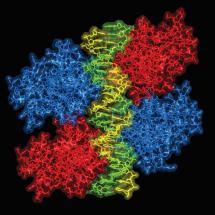
|
Bioinformatics
Doctoral Programme,
Faculty of Chemical Technology
The aim of the DSP programme is to educate specialists in bioinformatics, which is a combination of molecular and cell biology, biochemistry, statistics and computer science. Bioinformatics deals with the development of tools for the management of biological databases, algorithms for the processing of molecular-biological data and methods for the analysis and interpretation of relationships in these data. Most of the projects are biologically oriented with the aim to understand the complex context in the studied biological phenomena. However, we also run IT-oriented topics that include the development of algorithms or data processing methods. CareersThe combination of the education in natural sciences and informatics qualifies graduates to work in interdisciplinary teams. Graduates will find employment in a wide range of areas where data obtained by instrumental analysis of biological samples are processed. Graduates can also rely on a broad knowledge of informatics and can be successful in the development of software technologies, especially for data analytics. Graduates will further find employment in scientific infrastructures built in the Czech Republic within the framework of European operational programs. Due to the persisting lack of experts with an interdisciplinary education, graduates will also be easily employable outside the Czech Republic. Typical positions that DSP Bioinformatics graduate can hold: - researcher in basic or applied research in the public or private sector in the fields of biomedicine, clinical medicine, medical and pharmaceutical chemistry, food, agriculture, biotechnology or forensic science. Typical positions are postdoc, programmer, research associate, research fellow, project leader, project manager. - university lecturer in bioinformatics, computational biology, computational chemistry or applied informatics. Typical positions are assistant professor, assistant, lecturer. - software developer or data analyst in IT companies. - professional positions that require organizational and analytical skills and expertise not only in bioinformatics. Typical job positions include state administration at the highest management levels, organizations that are methodologically and organizationally engaged in science and research or non-profit and educational organizations. Programme Details
Ph.D topics for previous study yearComputational Biology for Integrative Omics in Clinical Research
AnnotationBlending clinical and basic research is crucial for advancing the understanding and treatment of cardiovascular diseases, including cardiac arrhythmia, hypertension, and other disorders, leading to heart failure. This PhD project focuses on developing computational pipelines for integrating gene expression, proteomics, and metabolomics data using R, Python, and advanced statistical methods. The aim is to create user-friendly, robust workflows that enable seamless analysis and interpretation of omics datasets in a clinical setting. Based on biopsies, human samples, and large and unique omics datasets, this project represents a collaboration between the scientific institute (IPHYS) and the clinical research centre (IKEM) in Prague. Funded by the CarDia consortium (https://cardia.ikem.cz/en/home ), this full-time position at IPHYS offers an opportunity to contribute to translational research with real-world clinical impact. Integrated approaches for metabolomics and lipidomics - data-driven insight using machine learning and biochemical networks
AnnotationThis PhD project focuses on advancing the integration of metabolomics and lipidomics to unravel the regulation of complex biochemical networks and metabolic dynamics. The study leverages state-of-the-art data processing techniques, computational tools, and machine learning algorithms to extract actionable insights from large-scale fluxomics datasets. Python-based pipelines will be developed to standardize data preprocessing, feature extraction, and analysis while incorporating machine learning models for network clustering, classification, and predictive modeling of metabolic pathways. The project emphasizes cross-disciplinary approaches, blending expertise in biochemistry, computational biology, and data science to create robust tools for understanding metabolic systems. Outcomes are expected to contribute to personalized medicine, metabolic engineering, and systems biology, offering novel methodologies and software frameworks for the scientific community. The work will be conducted at the IPHYS CAS, where the metabolomics and proteomics service laboratory is located. The work is financially secured in terms of material and full time position. The prerequisites for success are knowledge of programming languages for working with data (Python), basic biochemistry (metabolites, pathways, cellular compartments), and an overview of omics disciplines. Modelling the catalytic mechanisms of terpene synthases using deep learning
AnnotationThe goal of this project is to enable computational characterization and engineering of terpene synthases, an important class of biosynthetic enzymes responsible for creating the chemical scaffolds of the largest class of natural products, terpenoids. The project has three objectives: 1. Assembly of a comprehensive database describing the reaction mechanisms of terpene synthases characterized to date. 2. Development of a deep learning model using transformer neural networks for predicting the substrates, products, and reaction mechanisms of terpene synthases directly from their amino acid sequences. 3. Development of a generative algorithm for designing artificial terpene synthases with a desired function. Computational mass spectrometry
AnnotationOur lab combines experimental (mass spectrometry, metabolomics and RNA-seq) and computational (bioinformatics and machine learning) approaches for the discovery of novel bioactive molecules derived from plants. The aim of this project will be the development of new computational methods for processing and interpreting small molecule mass spectrometry data, in particular for automated mass spectra interpretation, molecule annotation, and generation and visualization of molecular networks. Candidates for this position should be able to independently program in Java and Python. |
||||||||||||||||||||||||||||||||||||||||||||||||||||||||||||||||||||||||||||||||||||||
Updated: 21.1.2022 15:24, Author: Jan Kříž

